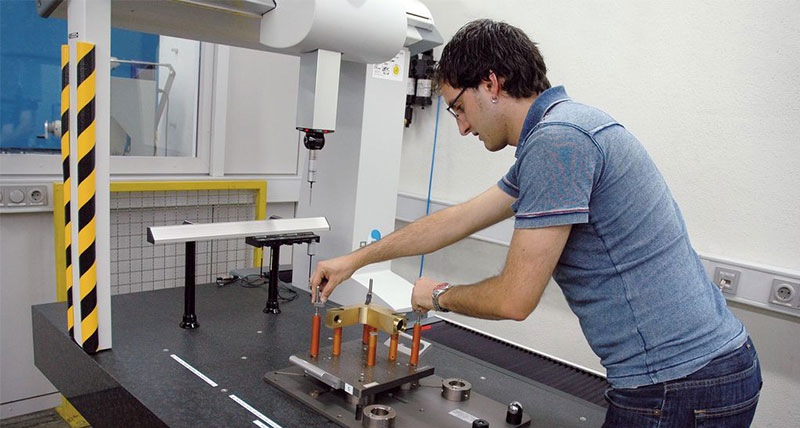3D Coordinate Measuring Machines ensure the form of bathroom taps
Hansgrohe - Germany
Contact us

In Turkey they relax in a hammam. The Japanese freshen up in an ofuro. In lifestyle magazines it is increasingly considered as an individual wellness oasis - we are of course talking about the bathroom. For over 100 years, Hansgrohe AG (www.hansgrohe.com) have made their contribution all over the world to the bathing culture with taps, mixers and showers that present the water the way it deserves. Behind the elegant, award-winning products are well-known designers, sophisticated technologies, the passion for water and the desire for innovation. And two DEA GLOBAL coordinate measuring machines as well. At the company headquarters in Schiltach, Germany, Hansgrohe keeps watch over form and function of bathroom taps, mixers and showers with the help of these 3D measuring machines.
Throughout the world, Hansgrohe AG stands for modern, designer-looking bathroom solutions and innovative sanitary products. Particularly noted is demand for the design of the Axor brand. Its precious water dispensers originate at the headquarters of the company in Schiltach. Brass is given form here, at their own foundry. With machining, grinding, and polishing, the blank gradually becomes a functional design object for the bathroom. Functional and design-oriented dimensions, assembly characteristics, and fitting dimensions of the Axor collections are inspected by the Hansgrohe employees using DEA GLOBAL measuring machines.
They simply rely on two DEA GLOBAL coordinate measuring machines. The first DEA GLOBAL measuring machine is located in the middle of the Metrology Department. It is employed as an all-round measurement system for the initial sample inspection process of various products. To support the production of the Axor collections in particular, Hansgrohe has recently invested in an additional DEA GLOBAL CMM.The new addition has found its place in the separate metrology room close to the Axor Mixers Production.New Creations Taking Shape The DEA GLOBAL CMM in production supports the team in the initial sample inspection. “With an additional DEA measuring machine we’ll reduce development time“, says Jürgen Raddatz, Metrology Manager at Hansgrohe AG. “This way, we’re close to the process, so we can control it, and immediately take action, in case measured values do not maintain the tight tolerances. Prior to that, at Axor Production we were completely dependent on the measuring machine of our central Metrology Department, which is located far away. Now the initial sample inspection is accomplished much faster.“
Automatic In-Process Inspection The new coordinate measuring machine has not only undertaken the tasks of its “colleague“ in Central Metrology. It also replaces the in-process inspection performed by dedicated gauges and measuring devices. Hansgrohe has accomplished successfully the switch over from manual to automatic inspection using the DEA GLOBAL. Jürgen Raddatz explains: “In Axor mixers production, in the past we used manual measuring devices in process. Therefore, we only inspected mixers and showers, we didn’t measure them. Now we have actual dimensions at our disposal. The 3D measuring machine provides us real measured values that we can document and analyse. Previously, it was much more difficult to approach the ideal. Thanks to the measuring machine, today we know exactly how we have to set up our machining centres, and we have the process much more under control.“
Easy measuring with the graphic user interface
Data points collected in the blink of an eye
The decisive factor: CAD import
As a result, at the Central Metrology Department we switched to PC-DMIS and the DEA systems. It was also obvious for us that the new measuring machine in mixers production had to be a DEA machine. This way we can execute the same measurement programs both on the machine in production and on the one in the Central Metrology Department.“
In the future, Hansgrohe AG will fully exploit the advantages of the results converter. As soon as the results of the new measuring machine in production are available, it will be possible to perform the statistical assessment of the process capability to further optimize the machining activity. The exclusive tap and mixer collections which are used in over 130 countries worldwide in hotels, cruise ships, apartments and private houses could not be manufactured in a more efficient way.
